
10.07.24
APM Terminals Mumbai (GTI) transitions to 80% renewable electricity
APM Terminals Mumbai, Gateway Terminals India (GTI), switched to 80% renewable electricity this month, with the commissioning of a 10.65 MW captive solar power plant through a Power Purchase Agreement (PPA) model with O2 Power.
The captive solar plant will generate more than 21 Gwh.of electricity per year, enough to power, among other things, the terminal’s quay cranes and reefers. A captive solar power plant is one that has been implemented by a company for its own consumption rather than taking existing renewable electricity from the grid. This is particularly relevant as, according to Reuters, India's share of high-emission coal-fired electricity generation reached a new high of 80% in January 2024 to meet rising demands for electricity. This latest switch to renewable electricity provides APM Terminals Mumbai with a significant advancement in its transition to becoming a renewable-energy powered container terminal.
Reduced carbon emissions
APM Terminals Mumbai’s CO2 equivalent emissions will be reduced by more than a projected 15,000 tonnes annually leading to 41% carbon emission reduction. In addition to this GTI will soon be signing an MoU with the Jawaharlal Nehru Port Authorities (JNPA) to initiate the development of Shore Power for vessels calling at GTI. At APM Terminals Mumbai we will also be piloting an electric internal transfer vehicle (ITV) and are committed to meeting JNPA’s vision of zero-emission trucking.
Mr. Unmesh Sharad Wagh, IRS, Chairman, JNPA, said, “The implementation of solar power at Gateway Terminals India is a transformative step, delivering a substantial total capacity of 10.65MWp. This strategic initiative is projected to significantly cut down pollution. This aligns with our vision of making all our terminals green in the next two years, emphasising the use of renewable energy for a sustainable logistics supply chain and operational excellence. By spearheading this transition, JNPA once again solidifies its role as an innovator and leader in the port and maritime industry."
“At APM Terminals Mumbai, we are integrating our global decarbonisation ambitions with Government of India’s Harit Sagar guidelines and ambitious targets outlined by JNPA in the ever-growing renewable energy segment. We are glad to partner with O2 Power to lift the standard of decarbonisation across our industry,” said Sunay Mukerjee, COO at APM Terminals Mumbai.
Previously in 2016, APM Terminals Mumbai became one of the first terminals in India to pilot the installation of solar panels on the roofs of the terminal’s workshop, Central Gate Complex and ship-to-shore crane machine houses. The system has a power generation potential of 361,000 kWh (kilowatt hour) units per year.
Aligned with Green Port Guidelines
Globally, APM Terminals made an industry-leading commitment to be fully net zero by 2040, and to reduce its scope 1 and 2 emissions by 65% by 2030 compared to 2022. In order to accomplish this, the company has created customised and actionable decarbonisation roadmaps to navigate highly fragmented solutions for container handling equipment. In doing so, this has aligned GTI with the commitment of achieving the zero carbon emission goal outlined by the Ministry of Ports, Shipping and Waterways in the ‘Harit Sagar’, Green Port Guidelines.
O2 Power is one of the fastest growing renewable energy companies in India, owned by EQT Infrastructure and Temasek. The successful partnership between O2 Power and GTI will enable enhanced sustainability initiatives and foster long-term economic and environment resilience, with tangible benefits for both the organizations and society at large.